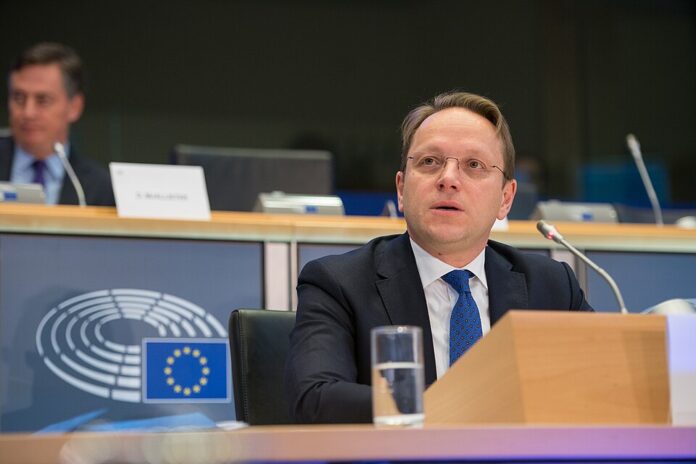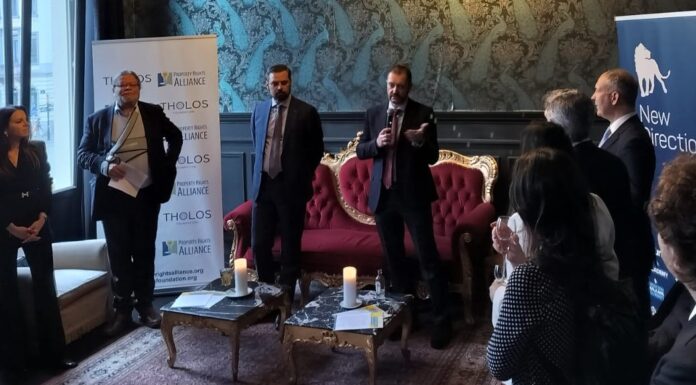
Last week, European Commission President Ursula von der Leyen survived two no-confidence votes in the European Parliament. Even if she did so with relative ease, and her leftwing and rightwing opponents failed to get the necessary two-thirds support, only a narrow majority backed von der Leyen. Still, the mood remains tense in her institution. What’s next for the Commission?
Notable was how the French centre-right Les Républicains, which are part of the centrist European People’s Party (EPP), supported the motion of Marine Le Pen’s National Rally’s EP group to oust von der Leyen. Also, there is grumbling among the centre-left. German SPD MEP René Repasi even warned von der Leyen that she has six months to deliver on the promises she made to his centre-left group, or it could put forward its own censure motion.
Telling is how the EU Commission President admitted that the European Parliament’s grievances “come from a place of genuine and legitimate concern.” Clearly, von der Leyen knows that she cannot afford to lose too many EPP MEPs any more, given how the EPP is no longer shy to work with the more right-wing groups.
Up next is a parliamentary battle on the EU Commission’s proposal for the EU’s long-term budget for 2028–2034. This can be safely summarized as a predictable series of demands for more EU taxes, more debt and more spending – amounting to a massive 2 trillion euro.
Petri Sarvamaa, Finland’s member of the European Court of Auditors, on the proposed 2028-2034 #eubudget #mff:
“It has a limited focus on results, no information on actual costs of programmes or projects is required, it’s not really clear what we get for the money… there’s no… https://t.co/qV44oRN17w
— Pieter Cleppe (@pietercleppe) October 16, 2025
To be fair, many in the European Parliament are not critical about this proposal because of the intention to spend more. On the contrary, the likes of Italian EPP MEP Salvador de Meo are reportedly warning about “underfunding for companies and citizens” relying on EU funds, supposedly in some parallel universe where EU funds are actually doing some good – contrary to the experience of large-scale cronyism.
The fact that the nominally centre-right EPP cannot be trusted here to defend some budgetary sanity is yet more evidence that it is safe to not rely on the European Parliament as a proper watchdog of the EU institutions. In any case, one diplomat confided to Politico nobody needs to worry about an overly powerful European Parliament, stating: “I don’t believe in this new Parliament, sorry. (…) They can threaten, but when a leader picks up the phone, they always fall in line.” One example of that is how the socialist group recently went along with von der Leyen’s omnibus bill, a modest exercise in EU regulatory simplification, after Spanish PM Pedro Sanchez intervened.
A possible Hungarian scandal in the Berlaymont
Perhaps von der Leyen needs to worry more about developments within her own institution. There is of course Pfizergate, whereby the European Court of Justice ruled that the European Commission violated transparency rules by failing to grant access to text messages between Ursula von der Leyen and the CEO of pharma giant Pfizer.
Then there are also the recent allegations that the Hungarian government would have deployed intelligence officers to Brussels to gather information on EU institutions and to recruit an EU official. Germany’s Der Spiegel, Belgian daily De Tijd and Hungarian outlet Direkt36 thereby claim that Hungarian intelligence officers disguised as diplomats would have attempted to infiltrate EU institutions during the period when the current Hungarian European Commissioner, Olivér Várhelyi, served as Hungary’s ambassador to the EU.
Várhelyi has reportedly told President Ursula von der Leyen he was “not aware” of the alleged spying activities. Her spokesperson told media afterwards that “the president is pleased to have sat down with the Commissioner on this issue and the working group will continue its work on the subject.” In other words: von der Leyen is absolutely not keen to escalate this, and also other European governments will prefer not to engage into a direct diplomatic clash, if everything would be proven.
Hungarian Commissioner Várhelyi’s agenda rolls on despite spying allegations https://t.co/y0sTkj2BuU pic.twitter.com/p1Ozrc6iwu
— Euractiv (@Euractiv) October 14, 2025
As I have noted before, if it is serious about fighting cronyism, the EU should cut its EU transfers for all Member States, given how easy it is to otherwise accuse the EU of “double standards”. Stories about cronyism and executive control of the judiciary have been popping up all across other Central and Eastern European countries, like Poland, the Czech Republic, Romania and Bulgaria. Obviously, similar problems have been evident in the old EU member states as well, not to mention Italy. In 2021, Professor Vince Musacchio, a renowned anti-corruption expert from the Rutgers Institute on Anti-Corruption Studies, has warned that between 2015 and 2020, the EU has allocated around €70bn to Italy in structural & investment funds. Half of these funds ended up in the hands of organised crime.”
That said, to see EU Commissioner Olivér Várhelyi stepping down would perhaps not the saddest of outcomes. He is responsible for health policy but has been telling MEPs that “new tobacco and nicotine products pose health risks comparable to traditional ones.” This is simply unscientific to the core and should disqualify him from this position. Channelling his inner nannycrat, Várhelyi has also been pushing for a taxation system on products high in sugar, fat, and salt to help finance public health during a meeting with the European Parliament’s health committee, thereby arguing some of those receipts should go to the EU budget. So much for the idea of “Orban’s man” standing up against Brussels.
The Trump effect
Despite all of that, it is safe to predict that EU member states seem largely content to allow the European Commission to continue with “business as usual” and that the increased influence of the right in the European Parliament is unlikely to bring material change. However, there still is US President Donald Trump.
So far, he has already forced the EU to drop its plans for digital taxation, while the US also obtained concessions on the EU’s planned climate tariff, CBAM, causing the likes of South Africa to demand equal treatment. The new tariff is likely about to hit African economies hard. South Africa’s Presidential Climate Commission estimates that CBAM would cut Africa’s exports to the EU by 30-35% – worth between €1.7 billion and €2.1bn – by 2030.
Despite the trade ceasefire agreed between the EU and the U.S. this Summer, Trump has threatened with new tariffs for the EU, responding to its 2.95 billion euro fine for Google. He warned:
“We cannot let this happen to brilliant and unprecedented American Ingenuity and, if it does, I will be forced to start a Section 301 proceeding to nullify the unfair penalties being charged to these Taxpaying American Companies.”
The Trump administration also continues to challenge the EU’s digital rules, calling these “Orwellian” and accusing the EU of censorship. Apparently, the U.S. is even considering sanctions in the form of visa restrictions against EU officials over the DSA.
Equally forcefully is the Trump administration’s push against green EU regulations that were passed during the first von der Leyen term, the “green deal” era.
Firstly, there is the new EU directive on corporate due diligence – the CSDDD, which imposes lots of new bureaucratic informational duties on companies trading with the EU, also American ones. The US administration has sent a document to the Commission early October requesting to exempt American companies from it. The Financial Times notes that in the document, the White House branded the legislation “serious and unwarranted regulatory over-reach” that “imposes significant economic and regulatory burdens on U.S. companies.” This was one of the drivers for a European Parliament committee vote to scale it back earlier this week.
US demands EU dismantle green regulations in threat to trade deal https://t.co/oMUSCUGy6I
— Financial Times (@FT) October 8, 2025
Furthermore, the Trump administration is also objecting to the upcoming EU anti-deforestation directive, which was in fact already challenged by the Biden administration. These new EU rules ban the import of goods if producers fail to prove that no forests were felled in their production. In September, the European Commission proposed to delay the implementation of the directive a second time, until 2027 instead of 2026, blaming an IT system issue.
According to one member state source, this may however be due to US pressure, and unrelated to the closure of the EU-Indonesia trade deal, as others have alleged. Trading partners like Indonesia and Malaysia are large exporters of palm oil and thereby heavily affected by the new bureaucratic burdens that EUDR would impose. Malaysia considers it unfair that its imports are classified as “standard risk”, as opposed to the US classification of “low risk”, given that deforestation there has improved significantly, with NGOs recognising a reduction of 13 per cent last year. Just as South Africa complains about US privileges in the context of CBAM, also here, the new two-tier system for trading partners is under fire. In this way, Trump does not only affect EU regulation, but also the EU’s trade relationship with the rest of the world.
Business as usual?
Despite the ongoing developments, the EU Commission’s 2026 work programme for 2026 appears to offer “business as usual”, without major changes to EU policy, apart from a “simplification” exercise that leaves major EU measures that burden competitiveness, like its ETS climate taxation, most “green deal” regulations, the AI Act and GDPR untouched. The centre-right EPP is likely to get some concessions on the new 2040 climate target the EU Commission has been pushing forward, but the question in the first place is whether there should be yet another climate target at all.
Yes, a range of proposed simplifications have been proposed, but major changes, like scrapping the EU’s climate taxation scheme, that would drastically cut the price of energy for European industry, remain an absolute taboo, despite the fact that the US, which lacks such a tax scheme, managed to reduce CO2 emissions more in relative terms per capita than the EU, since 2005.
Why is EU industry bleeding? The cost of the EU's de facto climate tax (ETS, a cap and trade scheme) is about twice as big as the total US natural gas price (red vs blue bar), which is only about 1/5 of the EU's natural gas price: https://t.co/t66Vmwj6xA
— Pieter Cleppe (@pietercleppe) September 22, 2025
Moreover, the EU intends to spin some of these modest simplifications as a gift to Trump. Whether this will fool him, is quite another matter.
In any case, regardless of Trump’ s pressure being effective or not, the EU should get its act together. Danish Foreign Minister Lars Løkke Rasmussen did sum it up nicely when saying any EU deregulation drive should not be just about pleasing Washington. He stated:
“If our investors are met with the red carpet in the U.S. and by red tape in Europe, they will, at the end of the day, choose the U.S.”
Until the European Commission tackles this challenge properly, it is likely to lurch from one crisis to the next.












